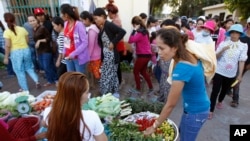Union leaders will send yet another request to the Ministry of Labor this week to call for changes to a contentious draft law that critics fear will take power away from labor organizations and benefit factories in Cambodia’s largest industry.
The garment industry employs some 600,000 people, but workers say a low monthly wage makes it impossible to make a living—leading to numerous strikes and demonstrations in recent years. With the government drafting a new law directed at union activity, labor leaders say they want to see changes that were made following an input meeting in July.
Ath Thorn, head of the Coalition of Cambodian Apparel Workers' Democratic Union, said that though the ministry has made some changes in the draft law, further significant changes are needed. And the draft should be released for unions to see, he said.
Sat Samoth, undersecretary of state at the Ministry of Labor, said changes have been made according to the July meeting. One provision, barring union leaders with criminal records, has been removed—but union leaders must avow they have never committed a crime, he said.
The latest draft calls for 10 workers in a factory for the formation of a union, down from 25 percent, he said. The required age for a union member has been reduced from 25 to 18, but unions must still conduct financial reports for their members, and copy the Ministry of Labor, he said.
Sat Samoth said the ministry is still making changes to the draft and is not yet ready to share it with unions. “It is being reviewed and adjusted,” he said.
Ath Thorn said more changes are needed, but unions need to see the full draft for review. “We have not seen the final draft, so we are still worried,” he said.
There are still parts that clash with labor law, he said, including a requirement that a union have 51 percent of its membership present for demonstrations or congresses.
“Holding a congress is a union’s right,” he said. “We can have as many or as few numbers as we want. Why would the government determine like that?”
Pao Sina, president of Collective Union of Movement Workers, said the changes are not enough. The ministry has only shown unions slides of changes it has purportedly made, but it has not shown them the full draft, which would allow them to make more suggestions, he said. “It is not enough,” he said. “We want the final draft so we can check all the articles.”







